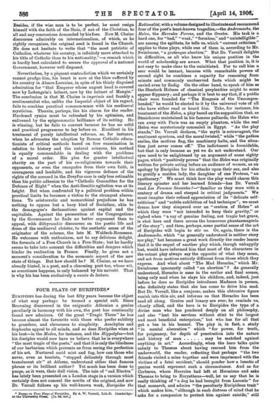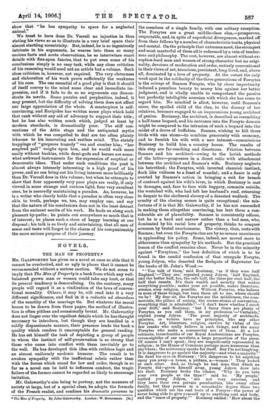FOUR PLAYS OF EURIPIDES.*
EURIPIDES has during the last fifty years become the object of what may perhaps be termed a special cult. Since Browning discovered in the enigmatic Athenian a genius peculiarly in harmony with his own, the poet has continually found new admirers. Of the great "Tragic Three" he has become almost the favourite with those who prefer subtlety to grandeur, and cleverness to simplicity. Aeschylus and Sophocles appeal to all minds, and so does Euripides when at his best—in the Medea, for instance, and the Hippolytus—but his disciples would now have us believe that he is everywhere " the most tragic of the poets," and that it is only the blindness of our barbarism which prevents us from seeing the perfection of his art. Nurtured amid mist and fog, how can those who never, even as tourists, "stepped delicately through most translucent air" at Athens, understand either that famous phrase or its brilliant author ? Yet much has been done to purge, as it were, their dull vision. The tale of "sad Electra" has lately been presented on a London stage in a version which certainly does not conceal the merits of the original, and now Dr. Verrall follows up his well-known work, Euripides the * Essays on Four Plays of Euripides. By A. W. Verrall, Litt.D. Cambridge : at the UniTarssity Press. [7s. ed. net.] Rationalist, with a volume designed to illustrate and recommend four of the poet's least-known tragedies,—the Androniache, the Helen, the Hercules Furens, and the Orestes. His task is a hard one, for "bad," "weak," "formless," and "unintelligible " are among the epithets, he tells us, which "current criticism" applies to these plays, while one of them is, according to Mr. Swinburne, "a grotesque abortion." But Dr. Verrall delights in difficulties, as all who know his unique position in the world of scholarship are aware. What that position is, it is not easy to make clear to the uninitiated. For to call him a seer would be inexact, because with remarkable powers of second sight he combines a capacity for reasoning from minute and commonly unobserved facts which might be envied even by Zadig. On the other hand, to speak of him as the Sherlock Holmes of classical perplexities might to some appear flippancy; and perhaps it is best to say that, if a public chair were founded for "The Exegesis of the TJncompre- hended," he would be elected to it by the universal vote of all who have either read or heard him. Take, for instance, his treatment of the Helen, a play based on the supposition that, as Stesichorus maintained in his famous palinode, the Helen who ran away with Paris was an empty phantom, while the real Helen was mysteriously concealed in Egypt. "As the play stands," Dr. Verrall declares, "the myth is extravagant, the sentiment spurious, and the moral twisted," while "the pathos smiles, the motives flag, the machinery halts, and the situa- tion just never comes off." The indictment is formidable, but that is only because as yet we do not understand. Oar eyes need to be enlightened by an argument of some eighty pages, which "positively proves" that the Helen was originally written for private acting before an audience of women, as an apology by Euripides for his attacks upon their sex, and also to gratify a maiden lady, the daughter of one Proteus, "an apothecary." We must think how the play would charm this literary spinster and her learned friends—has Dr. Verrall read Les Femmes Savantes 1—" familiar as they were with a century of drama and steeped in critical judgments." We must imagine their refined appreciation of its "delicate self- criticism" and "subtle exhibition of bad technique"; we must dream how they simpered over an "oration of Helen" at which they were "not intended to keep their gravity," or sighed when "a ray of genuine feeling, not tragic but grave, is shot here and there across the humorous phantasmagoria of the story"; and then, perhaps, some partial sense of the art of Euripides will begin to stir us. Or, again, there is the Andromache, which "as generally understood is neither story nor play," but becomes a great work directly the reader learns that it is the sequel of another play which, though unhappily lost, would have informed him that most of the characters in the extant play always say the opposite of what they mean, and act from motives entirely different from those which they express. And what about "The Mad Heracles," which Mr. Swinburne ignorantly called "an abortion" ? As generally understood, Heracles is sane in the earlier and final scenes, being only mad when he slays his children, and, indeed, just before he does so Euripides introduces Madness in person, who definitely states that she has come to drive him mad. But Dr. Verrall, like a conjurer, makes this obtrusive figure vanish into thin air, and informs us that Heracles has been mad all along. Genius and lunacy are ever, he reminds us, closely allied, and the hero is to Euripides the type of a divine man who has pondered deeply on all philosophy, and also "lent his services without stint to the largest and most beneficial enterprises," but who has for all that got a bee in his bonnet. The play is, in fact, a study "in mental aberration" which "for power, for truth, for poignancy, for depth of penetration into the nature
and history of man may be matched against anything in art." Accordingly, when the hero talks quite calmly to Theseus about having rescued him from the underworld, the reader, reflecting that perhaps "the two friends visited a mine together and were imprisoned with the victims of a fatal accident," should ponder how a lunatic of genius would represent such a circumstance. And as for Cerberus, whom Hercules had left at Hermione and asks Theseus to bring to Euryetheus—well, let us say that he is really thinking of "a dog he had brought from Laconia" for that monarch, and admire "the peculiarly Euripidean trait" which makes him, "although in such distress of mind that he asks for a companion to protect him against suicide," still show that "he has sympathy to spare for a neglected animal."
We trust to have done Dr. Verrall no injustice in thus stating his views so as to illustrate in a very brief space their almost startling eccentricity. But, indeed, he is so ingeniously intricate in his arguments, he weaves into them so many curious facts and acute observations, he so intertwines exact details with *fine-spun fancies, that to put even some of his conclusions simply is no easy task, while any close criticism of his reasoning would need not an article but a volume. Such close criticism is, however, not required. The very cleverness and elaboration of his work prove sufficiently the weakness of his case. The one essential of a good play is that it should of itself convey to the mind some clear and immediate im- pression, and if it fails to do so no arguments can demon- strate its merits. Some puzzles and perplexities, indeed, it may present, but the difficulty of solving them does not affect our large appreciation of the whole. A masterpiece is self- convincing, and Euripides has written some plays which hold that rank without any aid of advocacy to support their title ; but he has also written much which, judged at least by modern standards, is dramatically poor. The stiff con- ventions of the Attic stage and the antiquated myths with which he was compelled to deal are too often plainly irksome to his innovating and restless mind. The stately trappings of "gorgeous tragedy" vex and cumber him ; "her sceptred pall" weighs upon him, and he would walk more easily without buskins, while demi-gods and heroes are some- what awkward instruments for the expression of sceptical or democratic ideas. That under such conditions the poet is almost always intensely interesting is a high proof of his power, and no can bring out his living interest more brilliantly than Dr. Verrall does in this volume ; but when he attempts to show that four apparently very poor plays are really, if only viewed in some strange and curious light, four very excellent ones, he is assuredly maintaining a paradox. As, however, he is a writer who clearly holds that a paradox is often very close akin to truth, perhaps we, too, may employ one, and say that the nature of his conclusions does not in the least detract from the eminent merits of his work. He leads us along such pleasant by-paths ; he points out everywhere so much that is of interest; he places such a store of happy learning at our disposal ; his talk is so lively and entertaining, that all men of sense and taste will forget in the charm of his companionship the more serious purpose of their journey.







































 Previous page
Previous page